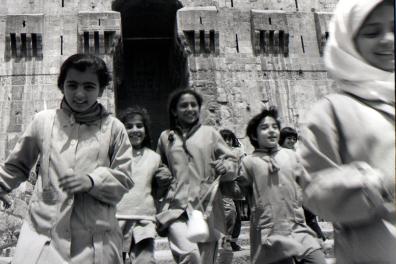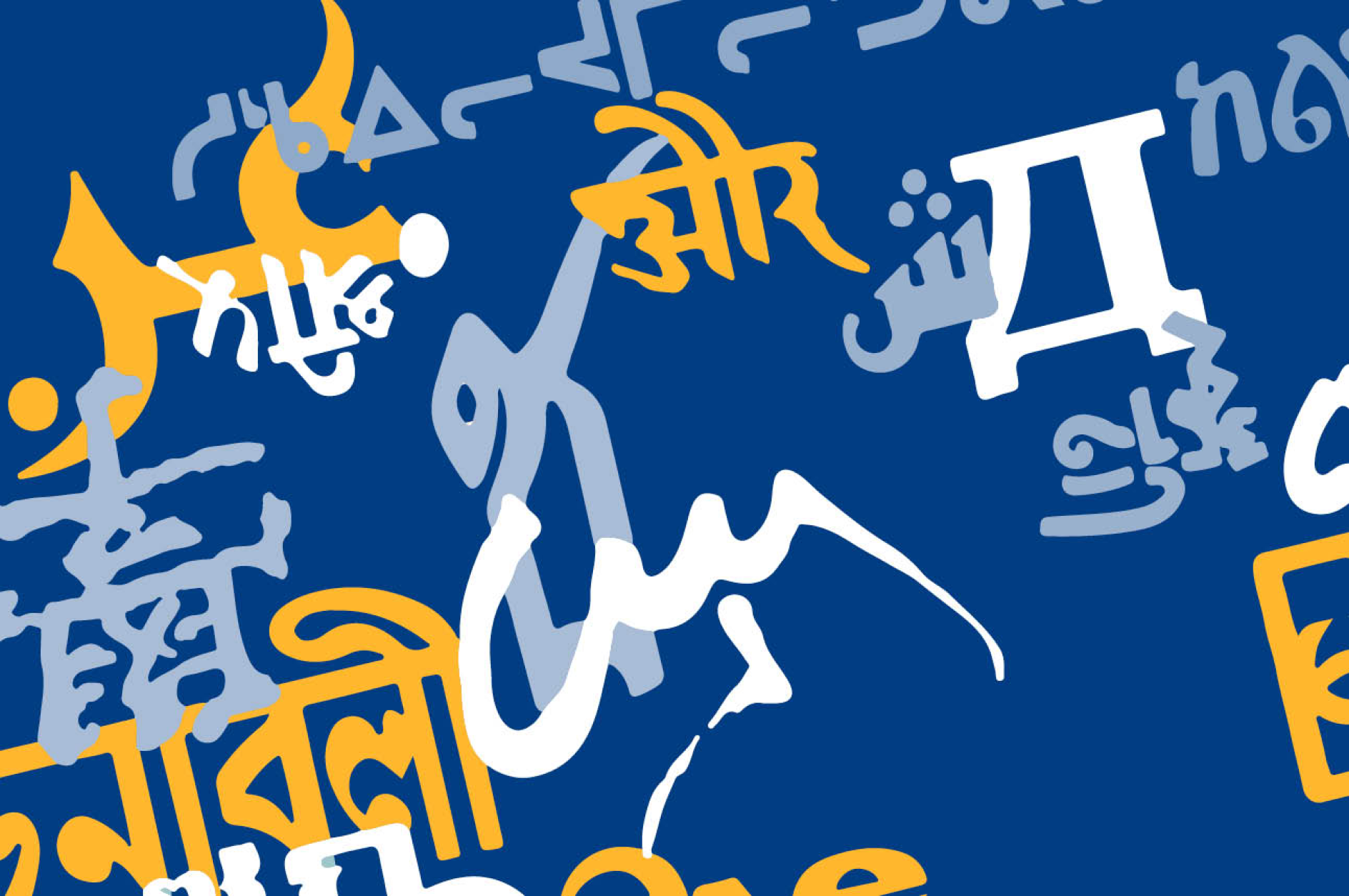Arabic studies
Inalco's "Arabic Studies" department has around 900 students and 45 teaching staff. It offers solid, demanding training in the different varieties of Arabic: literal (or standard) Arabic, Maghrebian Arabic, Oriental Arabic, Maltese and Soureth, as well as courses in linguistics, literature (classical, medieval, modern), Islamology and the social sciences.

Studying Arabic at Inalco
It means learning to read, write and speak Arabic: literal Arabic and/or one or more "dialects" spoken in the various Arab countries. Literary Arabic is the language of the written word, official discourse and the media throughout the Arab world "from the Gulf to the Ocean". It enables us to communicate across time, with access to writings over a millennium and a half old, including the sacred texts of Islam. It's not just the language of the prestigious classical heritage, it's also the written language of the present, which has undergone prodigious growth and profound change over the last century. It is the living language of modern Arab culture.
Mastering it is not enough to be able to speak in the Arab world and access all its cultural wealth: learning Arabic also means appropriating one or more of the Arab world's languages, divided into two major families, Maghrebi Arabic (Moroccan, Algerian, Tunisian, Libyan, Hassaniyya and Maltese) and Oriental Arabic (Egyptian, Syrian-Lebanese).
The various Arabic bachelor's degrees also offer "civilization" courses that bring together courses in various social science disciplines: history (medieval, modern and contemporary), art history, geography, anthropology, sociology, Islamology and Arabic thought. The program also includes courses in literature and linguistics. Some explore the written literary heritage and describe the classical and modern language, and others are specific to a particular area (Maghreb, Middle East).
Languages taught
Literal Arabic, Maghreb Arabic (Algerian, Moroccan, Tunisian), Eastern Arabic (Egyptian, syrian-lebanese)
Courses
The "Arabic Studies" department offers a range of courses and diplomas depending on what you want to learn (literal Arabic, "dialectal" Arabic).
You want to learn literal Arabic?
- If you're a beginner (less than 250 hours of Arabic lessons), enroll in diplôme d'initiation. Obtaining this diploma then enables you to enroll in L1 LLCER literal Arabic.
- If you want to reach a good level in one year and are ready to work "intensively", the intensive diploma is for you.
- If you already have a good knowledge of Arabic (250 hours of Arabic courses and mastery of the grammatical notions of the 1st volume of Luc Deheuvels' Manual of Modern Arabic), you can enroll in the first-year bachelor's degree.
Don't know whether your level falls under the initiation diploma or the first-year bachelor's degree? Take the online placement test.
Warning, the diplôme d'initiation is a selective diploma. If you enroll in L1 without having the required level, you can only be reoriented in initiation if you meet the entry requirements for this diploma.
Are you especially interested in learning a dialect?
Choose your dialect, and enroll in the Maghreb Arabic license (Algerian, Moroccan, Tunisian) or the Oriental Arabic license (Egyptian, Syrian-Lebanese).
These licenses are open to beginners.
Our licenses
- License in Langue Littérature et Civilisation Etrangères (LLCER) d'arabe littéral
- License in Langue Littérature et Civilisation Etrangères (LLCER) d'arabe maghrébin (algérien, marocain, tunisien)
Contact: View e-mail - License in Langue Littérature et Civilisation Etrangères (LLCER) d'arabe oriental (égyptien, syro-libanais)
Contact: View e-mail - Double bachelor's degree in Foreign Language Literature and Civilization (LLCER) Arabic-Hebrew
Access the double bachelor degree page
Contact : View e-mail
Access the licenses page
Access the licenses brochures page
Want to specialize in Arabic after a bachelor's degree?
- Masters in Langue Littérature et Civilisation Etrangères (LLCER) "Arabic Studies" (Literal Arabic and Oriental Arabic)
Contact: View e-mail - Master in Langue Littérature et Civilisation Etrangères (LLCER) "Maghreb Arabic"
Contact: View e-mail - Master "Métiers de l'éducation"
Contact: View e-mail
Access the masters page
Access the masters brochures page
School diplomas
- Introductory diploma in Literal Arabic
- Intensive diploma in Literal Literal Arabic
- Diploma in Intensive Literal Arabic
- Diploma in Language (DL) in Literal Arabic
- Diploma in Language and Civilization (DLC) in Maghrebian Arabic (Algerian, Moroccan, Tunisian)
- Diploma in Language and Civilization (DLC) of Oriental Arabic, consisting of the L1, L2, L3
- Diploma in Civilization in Islamology
Access the School diplomas page
Access the School diplomas brochures page
Introductory courses
Pre-requisites
The literal Arabic degree is a demanding course that requires a good level of Arabic and French and a great capacity for work.
- The introductory diploma is aimed at complete beginners in Arabic as well as "false beginners" who already have a small level of Arabic (equivalent to LV3 in high school). The introductory year ensures real competence in Arabic. It culminates in a diploma, renowned in France and beyond.
- Licence 1 d'arabe littéral : enrolment in the first year of the licence (L1) is automatic for all holders of the baccalauréat (general, technological and vocational), but presupposes a solid knowledge of Arabic (equivalent to LV2 in secondary school). At the start of the L1 literal Arabic year, a test verifies students' language level. Reorientation to Initiation is not automatic and is subject to review by a commission. If the student is not admitted to Initiation and is unwilling/unable to remain in L1, his/her enrolment fees will not be refunded.
- The Intensive Diploma is a highly demanding course that assumes a great capacity for work and solid motivation. Students are selected on the basis of applications and interviews.
- Licences 1 in Maghrebian Arabic and Oriental Arabic are aimed at beginners, with no pre-requisite level of Arabic.
Tutoring
Tutoring is for volunteer students who commit to attending sessions throughout the year. It enables students to work in small groups on course points to be reviewed, and method in civilization. In addition to the progress made, attendance is rewarded at the end of the semester by a bonus on the corresponding TD mark. There are language tutoring slots for introductory and L1 (in language and civilization) and L2 students.
To be admitted, you need to be enrolled! Registrations are made directly with your TD teachers, who forward them to the coordinators: Mr. Mathias Hoorelbeke for language in Initiation, Mr. Luc Deheuvels for language in L1, Ms. Chantal Verdeil for civilization (Initiation and L1), and Ms. Nina Van Kampen for L2.
Several groups are proposed, in literal Arabic, dialectal Arabic and civilization.
Please note that changes may be made during the semester, depending on enrolments and needs.
Department administration
Director: Vanessa VAN RENTERGHEM View e-mail
Deputy director: Fadi JABER View e-mail
